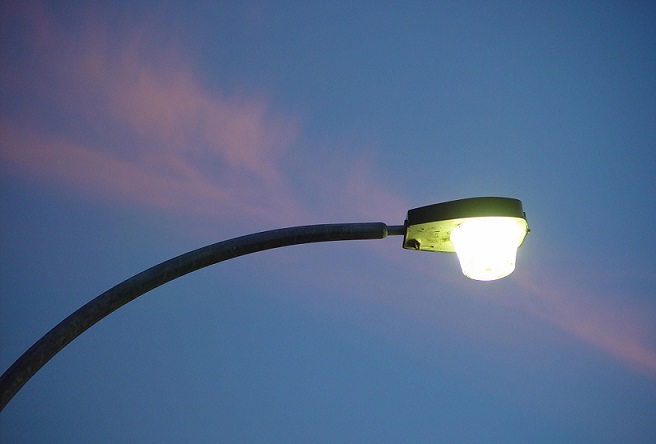Internet of Things
How to Build an Automatic Street Light Controller
Dhilan Mandaliya

Did you ever think that how the street lights automatically turn ON in the night and turn OFF automatically at morning? Is there any person who comes to ON/OFF these lights? The following circuit that described below which perform this job automatically. This circuit employed the output from an uncomplicated light/dark activated circuit and oblige a relay in its output which can be further attached to switch ON/OFF a street light and electrical application in a household also.Automatic street light control is used to control the street lights(Turn on and off based on the light).
Read more..
 Looking to build project on Automated Street Lighting?:
Looking to build project on Automated Street Lighting?:
Skyfi Labs gives you the easiest way to learn and build this project.
- Automated Street Lighting Kit will be shipped to you (anywhere in the world!)
- Use high quality videos to understand concepts and build the project
- Get 1 to 1 expert assistance from Skyfi Labs engineers while doing the project
- Earn a smart certificate on finishing the project
You can start for free and pay only if you like it!
It is a simple and powerful concept, which uses transistor (BC 547 NPN) as a switch to switch ON and OFF the street light system automatically.It automatically switches ON lights when the sunlight goes below the visible region of our eyes. (e.g in evening after Sunset). it automatically switches OFF lights when Sunlight fall on it ( i.e on LDR ) e.g in morning, by using a sensor called LDR (Light Dependent Resistor) which senses the light just like our eyes.
Latest projects on Internet of Things
Want to develop practical skills on Internet of Things? Checkout our latest projects and start learning for free
Automatic Street Light Controller Project Description:
- LDR: =A photoresistor (or light-dependent resistor, LDR, or photo-conductive cell) is a light-controlled variable resistor. The resistance of a photoresistor decreases with increasing incident light intensity; in other words, it exhibits photoconductivity. A photoresistor can be applied in light-sensitive detector circuits, and light-activated and dark-activated switching circuits.
- )LED: A light-emitting diode (LED) is a two-lead semiconductor light source. It is a p–n junction diode that emits light when activated.When a suitable current is applied to the leads,electrons are able to recombine with electron holes within the device, releasing energy in the form of photons. This effect is called electroluminescence, and the color of the light (corresponding to the energy of the photon) is determined by the energy band gap of the semiconductor. LEDs are typically small (less than 1 mm2) and integrated optical components may be used to shape the radiation pattern
- 4.7k Resistor A resistor is a passive two-terminal electrical component that implements electrical resistance as a circuit element. In electronic circuits, resistors are used to reduce current flow, adjust signal levels, to divide voltages, bias active elements, and terminate transmission lines, among other uses. High-power resistors that can dissipate many watts of electrical power as heat, may be used as part of motor controls, in power distribution systems, or as test loads for generators. Fixed resistors have resistances that only change slightly with temperature, time or operating voltage. Variable resistors can be used to adjust circuit elements (such as a volume control or a lamp dimmer), or as sensing devices for heat, light, humidity, force, or chemical activity.
- Bread Board: = A breadboard is a construction base for prototyping of electronics. Originally it was literally a breadboard, a polished piece of wood used for slicing bread. In the 1970s the solderless breadboard (a.k.a. plugboard, a terminal array board) became available and nowadays the term "breadboard" is commonly used to refer to these.
- )Arduino: = Arduino Uno is a microcontroller board based on the ATmega328P (datasheet). It has 14 digital input/output pins (of which 6 can be used as PWM outputs), 6 analog inputs, a 16 MHz quartz crystal, a USB connection, a power jack, an ICSP header and a reset button. It contains everything needed to support the microcontroller; simply connect it to a computer with a USB cable or power it with a AC-to-DC adapter or battery to get started.. You can tinker with your UNO without worrying too much about doing something wrong, worst case scenario you can replace the chip for a few dollars and start over again.
- Arduino IDE, Arduino Web editior
 Did you know
Did you know
Skyfi Labs helps students learn practical skills by building real-world projects.
You can enrol with friends and receive kits at your doorstep
You can learn from experts, build working projects, showcase skills to the world and grab the best jobs.
Get started today!
Kit required to develop How to Build an Automatic Street Light Controller:
Technologies you will learn by working on How to Build an Automatic Street Light Controller:
Automatic Street Light Controller with IoT
Skyfi Labs
•
Published:
2018-05-20 •
Last Updated:
2022-05-20
 Looking to build project on Automated Street Lighting?:
Looking to build project on Automated Street Lighting?:
 Did you know
Did you know